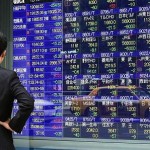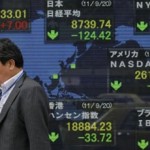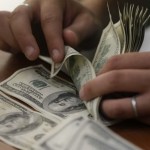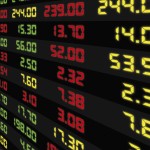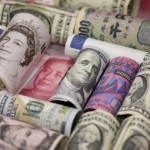Asian Stocks Rally With Won, Bonds After Fed as Crude Oil Gains
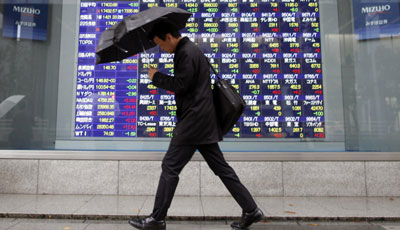
-
Kiwi weakens as central bank flags more easing; won jumps
-
Iron ore, coking coal and steel prices surge in China
Asian stocks rallied With European equity index futures and bonds after central banks including the Federal Reserve indicated monetary policies will remain accommodative.
With Japanese markets shut for a holiday, an MSCI index of shares elsewhere in Asia climbed for a sixth day. U.S. equities advanced in the last session and the dollar weakened as the Fed left rates unchanged and scaled back its projections for hikes in 2017 and beyond. The won jumped the most since June as gains in commodity prices supported the Australian dollar. New Zealand’s currency weakened and its bonds surged after its central bank said further policy easing is expected. Crude oil gained following a slide in U.S. stockpiles.

Loose monetary policies in the U.S., Europe and Asia have helped drive gains in stocks, bonds and commodities this year and the latest signals from central bankers suggest the era of cheap money has further to run. While the Fed still sees a rate hike this year, its projection for increases in 2017 was trimmed to two from three. Japan’s central bank on Wednesday pledged to overshoot its 2 percent inflation goal and took steps to limit the negative side effects of its record stimulus.
The period “of having very low developed market rates for a very long time, and investors needing yields, that is still there,” Peter Kinsella, head of emerging market economic and foreign-exchange research at Commerzbank AG, told Bloomberg TV in Hong Kong. “We had previously thought it was going to be an aggressive Fed rate hiking cycle and it’s clearly not going to be that.”
Speeches are due Thursday from the heads of the European Central Bank and the Bank of England, while at least seven central banks have policy reviews. Indonesia is forecast to lower interest rates and about a third of economists surveyed by Bloomberg are predicting a cut in Norway, while monetary authorities in South Africa and Turkey are seen leaving borrowing costs unchanged. France has business confidence gauges coming and a measure of consumer sentiment in the euro area is also scheduled.
Stocks
The MSCI Asia Pacific excluding Japan Index was up 1 percent as of 7:12 a.m. London time. Gauges of raw-materials producers and energy stocks rallied at least 1.8 percent. Benchmarks were little changed in Singapore and Taiwan, while other regional markets saw gains.
Nine Dragons Paper Holdings Ltd. jumped as much as 11 percent in Hong Kong after the Chinese paper maker reported results and boosted its profit forecast. Hanjin Shipping Co., the South Korean container line that has sought bankruptcy protection, surged 30 percent after securing new loans. from top shareholder Korean Air Lines Co., which rallied 5.9 percent. Newcrest Mining Ltd., Australia’s biggest gold producer, rose 7 percent.
Futures on the Euro Stoxx 50 Index added 0.5 percent. S&P 500 Index contracts declined 0.1 percent, after the U.S. gauge climbed 1.1 percent in the last session.
Currencies
The Bloomberg Dollar Spot Index fell 0.2 percent, after sliding 0.7 percent on Wednesday. The won jumped 1.6 percent, leading gains among major currencies.
The yen was little changed, after volatile trading on Wednesday that saw swings of more than 1 percent in both directions following the BOJ meeting. The Japanese central bank’s policy tweaks give it scope to keep easing to revive the economy and inflation, while limiting the negative impact on bank earnings.
The ringgit strengthened 0.7 percent, the most in a month, as the pickup in oil prices brightened prospects for Malaysia, Asia’s only major net exporter of crude. Among the currencies of other resource-exporting nations, the Aussie and Canada’s dollar rose 0.3 percent.
The kiwi weakened 0.1 percent, the biggest loss among major currencies. The Reserve Bank of New Zealand kept its key interest rate at a record low on Thursday and saidfurther reductions will be needed in order to move inflation toward its 2 percent target. Investors increased bets on a November rate cut, with the probability of a move by then rising by 18 percentage points to 69 percent in the swaps market.
“The RBNZ Statement, although little changed from August, was slightly more dovish than the market anticipated,” said Jason Wong, a currency strategist in Wellington at Bank of New Zealand Ltd. “This was probably a tactical move by the central bank to avoid any undesired appreciation in the kiwi.”
Bonds
New Zealand’s 10-year bonds jumped by the most in three months, pushing their yield down by 13 basis points to 2.49 percent. Comparable yields in Australia and South Korea dropped by at least seven basis points to 2.04 percent and 1.53 percent, respectively.
The rate on similar-maturity U.S. Treasuries was little changed at 1.65 percent, after decreasing four basis points on Wednesday. Jeffrey Gundlach, the chief investment officer at DoubleLine Capital LP, said on CNBC that the yield will rise above 2 percent in 2016 and a Fed interest-rate increase in December isn’t a given. Bill Irving, co-manager of Fidelity Government Income Fund, said yields will remain low and there’s a 60 percent chance of a Fed hike by year-end.
Commodities
Crude oil for delivery in November rose 1 percent to $45.77 a barrel in New York, after rallying 2.9 percent in the last session. U.S. inventories fell by 6.2 million barrels last week, official data showed Wednesday, spurring optimism a glut will ease. OPEC members Saudi Arabia and Iran, whose rivalry derailed an oil supply accord earlier this year, held talks in Vienna a week before the organization and Russia meet Sept. 28 in Algeria to discuss measures to stabilize prices.
The post-Fed decline in the dollar boosted prices of industrial metals, with copper, aluminum and lead climbing at least 0.8 percent in London. Nickel gained 1 percent as investors weighed the prospect of more mine closures in the Philippines, the biggest exporter of nickel ore. The nation’s government saidWednesday that more than 10 suppliers will probably be suspended in addition to 10 that have already been halted after an environmental audit.
Iron-ore futures jumped as much as 5.3 percent on China’s Dalian Commodity Exchange, the biggest gain in more than a month, and coking coal climbed to its highest since January 2014. Huatai Futures Co. said coal prices are being boosted by speculation of a shortage and that’s spurring gains across the steel supply chain. Steel reinforcement bar increased as much as 3.2 percent in Shanghai.
Source: Bloomberg









